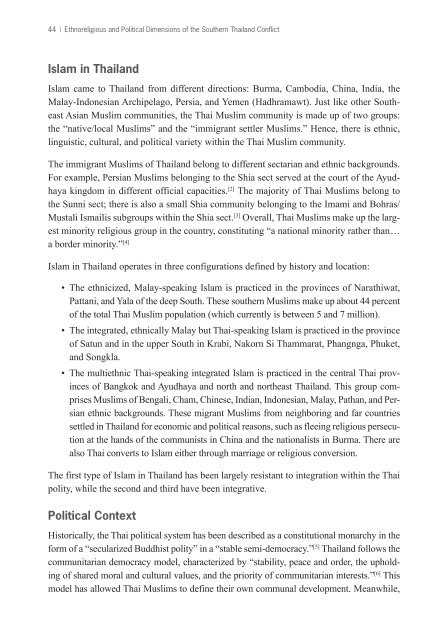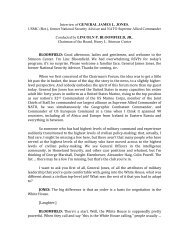Islam and Politics - The Stimson Center
Islam and Politics - The Stimson Center
Islam and Politics - The Stimson Center
Create successful ePaper yourself
Turn your PDF publications into a flip-book with our unique Google optimized e-Paper software.
44 | Ethnoreligious <strong>and</strong> Political Dimensions of the Southern Thail<strong>and</strong> Conflict<br />
<strong>Islam</strong> in Thail<strong>and</strong><br />
<strong>Islam</strong> came to Thail<strong>and</strong> from different directions: Burma, Cambodia, China, India, the<br />
Malay-Indonesian Archipelago, Persia, <strong>and</strong> Yemen (Hadhramawt). Just like other Southeast<br />
Asian Muslim communities, the Thai Muslim community is made up of two groups:<br />
the “native/local Muslims” <strong>and</strong> the “immigrant settler Muslims.” Hence, there is ethnic,<br />
linguistic, cultural, <strong>and</strong> political variety within the Thai Muslim community.<br />
<strong>The</strong> immigrant Muslims of Thail<strong>and</strong> belong to different sectarian <strong>and</strong> ethnic backgrounds.<br />
For example, Persian Muslims belonging to the Shia sect served at the court of the Ayudhaya<br />
kingdom in different official capacities. [2] <strong>The</strong> majority of Thai Muslims belong to<br />
the Sunni sect; there is also a small Shia community belonging to the Imami <strong>and</strong> Bohras/<br />
Mustali Ismailis subgroups within the Shia sect. [3] Overall, Thai Muslims make up the largest<br />
minority religious group in the country, constituting “a national minority rather than …<br />
a border minority.” [4]<br />
<strong>Islam</strong> in Thail<strong>and</strong> operates in three configurations defined by history <strong>and</strong> location:<br />
• <strong>The</strong> ethnicized, Malay-speaking <strong>Islam</strong> is practiced in the provinces of Narathiwat,<br />
Pattani, <strong>and</strong> Yala of the deep South. <strong>The</strong>se southern Muslims make up about 44 percent<br />
of the total Thai Muslim population (which currently is between 5 <strong>and</strong> 7 million).<br />
• <strong>The</strong> integrated, ethnically Malay but Thai-speaking <strong>Islam</strong> is practiced in the province<br />
of Satun <strong>and</strong> in the upper South in Krabi, Nakorn Si Thammarat, Phangnga, Phuket,<br />
<strong>and</strong> Songkla.<br />
• <strong>The</strong> multiethnic Thai-speaking integrated <strong>Islam</strong> is practiced in the central Thai provinces<br />
of Bangkok <strong>and</strong> Ayudhaya <strong>and</strong> north <strong>and</strong> northeast Thail<strong>and</strong>. This group comprises<br />
Muslims of Bengali, Cham, Chinese, Indian, Indonesian, Malay, Pathan, <strong>and</strong> Persian<br />
ethnic backgrounds. <strong>The</strong>se migrant Muslims from neighboring <strong>and</strong> far countries<br />
settled in Thail<strong>and</strong> for economic <strong>and</strong> political reasons, such as fleeing religious persecution<br />
at the h<strong>and</strong>s of the communists in China <strong>and</strong> the nationalists in Burma. <strong>The</strong>re are<br />
also Thai converts to <strong>Islam</strong> either through marriage or religious conversion.<br />
<strong>The</strong> first type of <strong>Islam</strong> in Thail<strong>and</strong> has been largely resistant to integration within the Thai<br />
polity, while the second <strong>and</strong> third have been integrative.<br />
Political Context<br />
Historically, the Thai political system has been described as a constitutional monarchy in the<br />
form of a “secularized Buddhist polity” in a “stable semi-democracy.” [5] Thail<strong>and</strong> follows the<br />
communitarian democracy model, characterized by “stability, peace <strong>and</strong> order, the upholding<br />
of shared moral <strong>and</strong> cultural values, <strong>and</strong> the priority of communitarian interests.” [6] This<br />
model has allowed Thai Muslims to define their own communal development. Meanwhile,

















